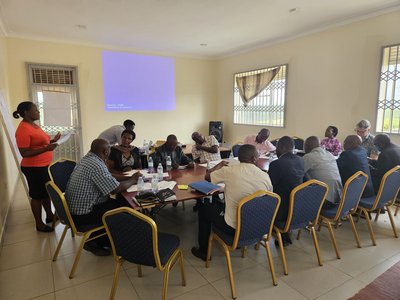Work packages
The project includes the following work packages:
WP1 - Climate change impacts on tea yield and quality
Objectives
WP1 (climate and system modelling) focuses on major tea growing areas in Uganda and conducts a socio-economic baseline survey and climate-crop modelling to understand their current position and future suitability in the contect of tea agroecosystem providing both tea production and local values, tThrough advanced statistical modelling of past and future weather data, household surveys and process-based simulation modelling of tea agroecosystem under regionally tailoered “Shared Socioeconomic Pathways”.
Outputs
*1 MSc thesis, 1 PhD thesis, 2 scientific papers, 2 conference cotnributions
* Report on historical trends and rates in rainfall and temperature changes in major tea-growing areas of Uganda
* Improved models parameterization for simulating tea-based agroecosystems under past and future climate
* Documented assessment of future suitability of tea-growing areas in Uganda based on projected climate under improved regional socio-economic predictions of tea production in Uganda
Students
Adiga Hassan (PhD student), Department of Geography, Geo-informatics and Climatic Sciences at Makerere University
Evelyn Katasi (MA student), Department of Environmental Management at Makerere University
WP2 - Screening-selecting tea genotypes for resilience to abiotic and biotic stress
Objectives
WP2 (crop phenotyping) screens abd selects tea genotypes for resilience to abiotic and biotic stresses by employing new methods to estimate net primary production, quantify drought-heat stress and tolerance, resistance to pests and soil-borne pathogens, for existing commercial tea clones and newly bred genotypes, based on micro-meteorology, multispectral-thermal remote sensing, and chlorophyll fluorescence, to select and recommend for commercialization and future breeding activities will be carried out at selected fields at R-ZARDI.
Outputs
*1 MSc thesis, PhD thesis with 2 scientific papers
* 3+ high-yielding tea genotypes adapted to drought and heat, diseases and pests
* Models for calculating tea net primary production and transpiration based on canopy reflectance and temperature data
Students
Sarah Namayengo (PhD student), Department of Forestry, Bio-diversity and Tourism at Makerere University
Vereriano Turyahebwa (MA student), Department of Forestry, Bio-diversity and Tourism at Makerere University
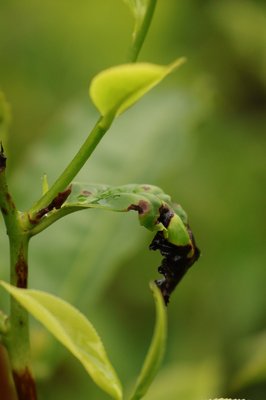

WP3 - Evaluation of NbS for climate resilience, higher yield and biodiversity
Objectives
WP3 (soil amendments and nature-based solutions) focuses on improving the soil and the plant components of the tea agroecosystem through nature-based solutions involving locally-sourced bioresources as soil amendments to restore depleted soils, increase above- and belowground biodiversity with agroforestry and intercropping and strengthen climate resilience with adapted varieties, based on experiments in glasshouses at MAK and tea fields at R-ZARDI using conventional measurements and novel imagery methods.
Outputs
*1 MSc thesis, 1 PhD thesis, 2 scientific papers and 2 conference contributions
* Catalog of plausible and research-based nature-based solutions in tea systems combining agroforestry, mulch-biochar, irrigation and resilient tea varieties to increase multiple ecosystem services, including food production, biodiversity, tea yield, side-streams valorization.
* Documented at least 2 agroforestry and intercropping systems that provide both tea production and local food production for improved climate resilience of tea farmers in Uganda with quantified effects
Students
Vivian Namutebi (PhD student), Department of Agricultural Production at Makerere University
Ben Okurut (MA student), Department of Agricultural Production at Makerere University
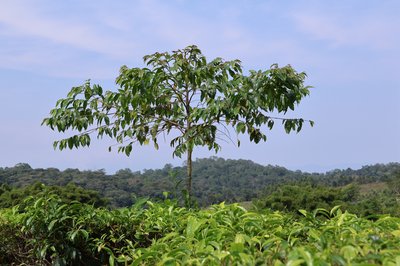
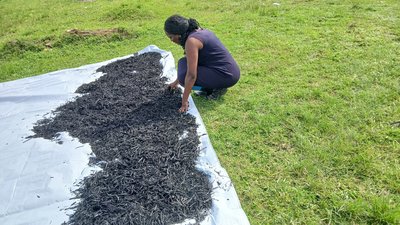
WP4 - Innovating smart and scalable irrigation technology for improved tea production
Objectives
WP4 (local-scale irrigation) innovates smart and scalable irrigation technology for improved tea production through first assessing the irrigation needs and agronomic added value of irrigation, extent for plausible irrigation, and developing guidelines for smart irrigation scheduling and affordable drought stress levels using the solar-powered irrigation system covering about 15 acres and a test facility with permanent water source and water storage tanks, both available at R-ZARDI to study, design, and optimize experimental smart solar irrigation system alongside a private company KickStart.
Outputs
*1 MSc thesis, 1 PhD thesis, 2 scientific papers and 2 conference contributions
* Operational small-scale smart sprinkler and drip irrigation system with solar-pump
* Documented water- and nitrogen fertilizer response of tea yields and quality profiles for different varieties
* Prototype of one novel climate-smart technology for supplementary irrigation
Students
Keneth Chelimo (PhD student), Department of Agricultural and Bio-systems Engineering at Makerere University
Augustine Okot (MA student), Department of Agricultural and Bio-systems Engineering at Makerere University

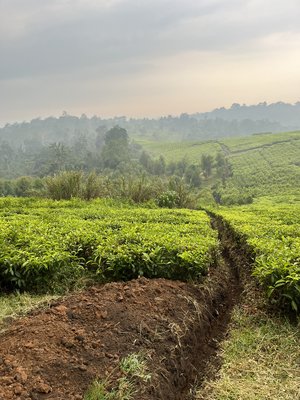
WP5 - Socio-economic assessment of tea-agroforestry and selected tea varieties
Objectives
WP5 (socio-economics) conducts detailed socio-economic assessment of the studied tea systems, including agroforestry and selected tea varieties, for feasibility and acceptability to innovative tea farming practices from the other WPs, investigate both local value and links to global market to empower especially women and vulnerable groups and ultimately assess the socio-economic benefits of implementing NbS in tea production along the tea value chain, largely through co-creation with multi-stakeholder innovation networks for economic feasibility and consumers’ valuation.
Outputs
*1 MSc thesis, 1 PhD thesis, 2 scientific papers and 2 conference contributions
* Co-creation model description through multi-stakeholder innovation networks for economic feasibility
* Market access assessment and women and vulnerable groups empowerment in the tea value chain
* Consumers’ valuation report for nature-based solutions in tea systems in Uganda
Students
Moreen Asasira (PhD student), Department of Agribusiness and Natural Resource Economics at Makerere University
Augustine Kigozi (MA student), Department of Agribusiness and Natural Resource Economics at Makerere University

